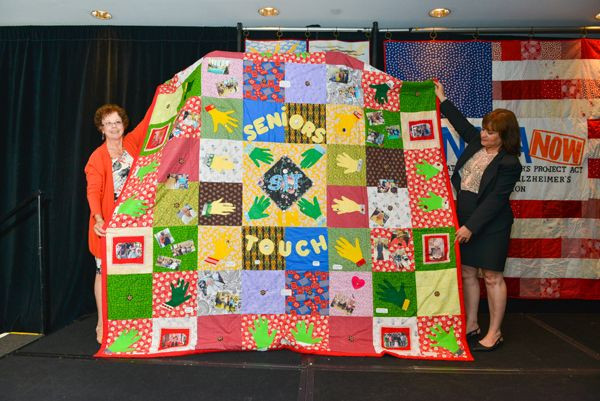Take A Memory Test To Learn Your Alzheimer's Diagnosis Early, The AFA Recommends

A quilt is a patchwork of small fabric pieces stitched together to create a whole. Like a quilt, the Alzheimer’s Foundation of America (AFA) sews together 2,400 member organizations across the nation, all of them dedicated to meeting the needs of people with Alzheimer’s. At its Concepts in Care conference today in New York city, the AFA emphasized memory screening for early detection of the progressive brain disorder and common form of dementia, which now affects five million Americans.
Bert E. Brodsky, founding chairman of AFA, talked to Medical Daily outside a hotel conference room packed with health care professionals and laypeople hoping to learn more about the nation’s sixth leading cause of death. Brodsky explained why he created AFA.
“The simple concept is you take programs throughout the country, you try and funnel them up to AFA, and then you try to transplant ideas from agency to agency,” said Brodsky, who also founded Sandata Technologies, LLC. If there’s a great program in Chicago, then, AFA will get wind of it naturally enough and tell all the other agencies about it, too.
A vital man sporting what looked like a Florida tan, Brodsky said another reason for beginning AFA was to raise awareness and to “expose what’s happening.” Funding was one other consideration, since many organizations will not give grants to a local organization. Bringing the funds into a national organization allows AFA to disseminate money to regional and local groups, as need be.
“We’re all about the here and now,” Charles Fuschillo, president and chief executive officer of AFA, told Medical Daily. “Knowing that the cure is not in sight, we want to ensure that individuals get the answers they need, and the best tools to take care of a loved one or somebody in their program or companies.”
Connection
In fact, the AFA helpline receives “thousands and thousands of calls,” in Fuschillo’s words, and it is staffed by licensed social workers who are dementia care professionals. “And if we need to make a referral in any state in the nation, for care, for research, we’re able to do that in any state through our member organizations,” explained the former New York state senator, who sponsored a number of laws intended to protect the health of citizens while in office.
His current plans for AFA include expanding the organization's outreach, growing its research funding capability, and increasing the number of member groups to 3,000 by the end of the year. And, now that the helpline is bilingual, he’s hoping to make it a 24/7 service, so people — whether they be patients, caregivers, family members, friends, or programs — can call in any time and talk to a live person and be referred to care, educational services, or training, as need be.
Meanwhile, Fuschillo runs a tight ship. “More than 84, 85 cents on every dollar goes back into our programs, so we’re conscious of every dollar we receive,” he said. This claim is far from unsubstantiated. Less than two percent of the 1,000,000 charities operating in the nation today meet the standards of accountability and effectiveness set by the Independent Charities of America for its “Best in America” seal. AFA is one of them.
So what can you do?
Early Detection
First and foremost: Urge your congressional representatives to provide more funding to Alzheimer’s research and caregivers, says Fuschillo. The current appropriation of $500 million to Alzheimer’s may sound like a lot, but it is not enough to meet current needs and with more people becoming ill each day, will not meet future needs.
“Get a memory screening,” Amanda J. Secor, AFA’s director of communications, told Medical Daily. “Think of it as a routine health check-up.” She explained how memory screenings are part of the Medicare annual wellness visit now, so for anyone 65 and older there’s no reason not to get screened.
In fact, Medical Daily took the test, a five- to 10-minute series of questions and answers which the social worker made sure to explain “is not a medical diagnosis.” Anyone who does poorly on the exam would go get checked out by a doctor; any number of medical problems, other than Alzheimer's, cause poor memory. But if you did discover you had Alzheimer’s, you would have time. Time to talk with your family about what happens when you arrive at the later stages of disease. Early detection gives you the chance to begin early treatment, discuss your future care, or simply set your financial house in order. For some people, it could even mean the opportunity to enroll in a clinical trial for a new drug that might cure the disease.
In any case, early detection would help you learn what's to come, how to cope. “My mother had Alzheimer’s and I didn’t know how to deal with it,” Brodsky told Medical Daily. “If you don’t know how to deal with it, how do you learn? That’s why I started AFA.”



























